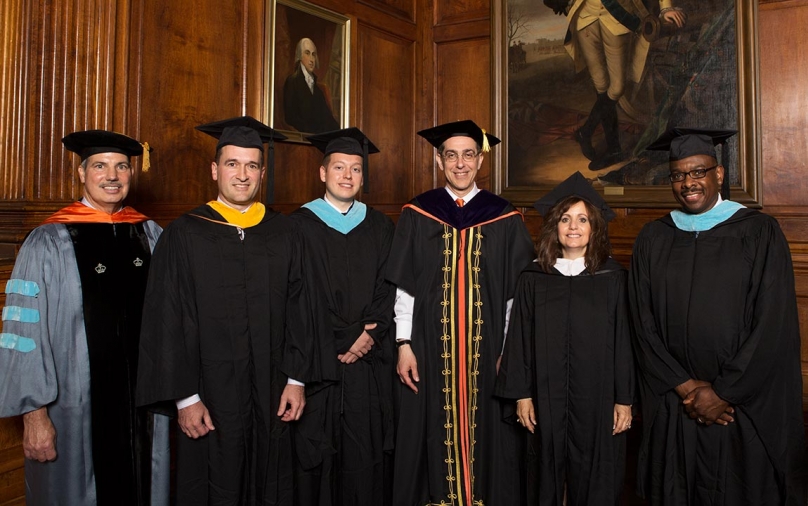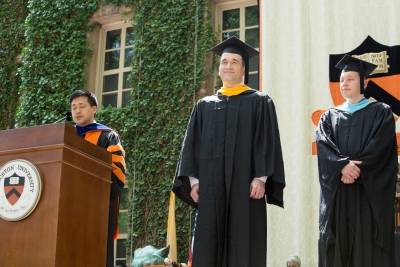May 24, 2016
Princeton to honor four outstanding New Jersey secondary school teachers

In the Faculty Room of Nassau Hall, Director of the Program in Teacher Preparation Christopher Campisano (left) and Princeton President Christopher L. Eisgruber (third from right) meet with four outstanding New Jersey secondary school teachers on Commencement Day. They are (from left) Richard Wertz, Matthew Morone, Barbara Fasano and Ronald Duncan Jr. (Photo by Denise Applewhite, Office of Communications)
[[{"fid":"720","view_mode":"page_banner","fields":{"format":"page_banner","field_file_image_alt_text[und][0][value]":"","field_file_image_title_text[und][0][value]":"","field_file_caption_credit[und][0][value]":"","field_file_caption_credit[und][0][format]":"full_html"},"type":"media","link_text":null,"attributes":{"height":208,"width":682,"class":"media-element file-page-banner"}}]]
Princeton University will honor four outstanding New Jersey secondary school teachers at its 2016 Commencement on Tuesday, May 31.
This year's honorees are Ronald Duncan Jr. of Saint Anthony High School in Jersey City, Barbara Fasano of High Point Regional High School in Sussex, Matthew Morone of Pascack Valley High School in Hillsdale and Richard Wertz of Verona High School in Verona.
The teachers were selected for the award based on nominations from public and private schools around the state. The teachers will receive $5,000, as well as $3,000 for their school libraries.
"Today, as our social and economic challenges grow more complex and difficult and we hold our teachers more accountable for the answers, it is easy to forget that teaching remains as much of an art as a science," said Christopher Campisano, director of Princeton's Program in Teacher Preparation, which administers the award program. "The four teachers we honor with this award demonstrate the art of teaching is still very much alive in our schools. Equally important is the passion, authenticity and love they bring into their respective classrooms applying their incredible skill and talent to fashion and mold uniquely beautiful portraits and sculptures reflected in the lives of their students."
The staff of the Program in Teacher Preparation selected 10 finalists, who were visited at their schools by Rosanne Zeppieri, a member of the program staff. Award winners were selected by a committee that was chaired by Dean of the College Jill Dolan. The panel also included Campisano, University faculty members Joshua Katz and Stanley Katz; Steve Cochrane, superintendent of the Princeton Public Schools; and Laura Morana, executive county superintendent of schools for Mercer and Middlesex counties.
"I applaud these teachers for the courage they show in holding fast to the promise of each and every student entrusted to their care," Campisano said.
Princeton has honored secondary school teachers since 1959. The University received an anonymous gift from an alumnus to establish the program.
Teachers honored this year are:
Ronald Duncan Jr.
The head of Saint Anthony High School in Jersey City says Ronald Duncan Jr. teaches "math class with soul."
"I am referring to the right combination of differentiated instruction, positive classroom management strategies and a classroom climate that respects student participation — with the perfect volume of soft jazz playing in the background," Head of School Chad Broussard wrote in a nomination letter.
Duncan's approach is clear even before students walk through his door. They wipe their feet on a doormat before entering his room, symbolically leaving behind the stresses of their day. They begin each class by composing haikus that are read aloud, building confidence from the sound of the bell. Music sets the mood and enhances his teaching. Mistakes are encouraged as stepping stones toward success.
"Every one of my students is something unique and beautiful and too precious to fail," Duncan wrote in a personal statement. "In my classroom, there are no bad students. There are bad circumstances, bad home lives, poor nutrition, but never bad students. The school at which I teach draws deeply from wells of hardship, and I know that I will fail them if I ever become too callous or too exhausted to address that."
Duncan, who has been at Saint Anthony for seven years, teaches algebra, algebra II and algebra II honors courses to students in grades nine through 12.
"He is a person who loves learners, learning and the teaching life," colleague Raymond Page wrote. "He is someone who has gone far beyond mastering technique … and has become a teacher, with a capacity for creating connections between himself, his students and his subject."
Sophomore Maria Osilla wrote that Duncan's support helped her learn about algebra, but also perseverance.
"Inside his classroom, I sometimes fell down," Osilla wrote. "But I looked up and I always saw Mr. Duncan holding a rope. He would pull me out of the hole."
Barbara Fasano
Barbara Fasano has known she wanted to become a teacher since the fourth grade, when she would gather her siblings around a miniature chalkboard for a lesson. "Dreams do come true," Fasano wrote in a personal statement.
Today, the students gathering around Fasano are ninth-graders at High Point Regional High School in Sussex, where she teaches Advanced Placement world history and world studies.
She has been at the school for 14 years and had built a reputation as a master teacher and championship-winning softball coach when she took on a new challenge in 2014. That year, she began teaching the new AP course, which offers students in their first year of high school a rigorous curriculum with the opportunity to earn college credit through an exam.
"As a result of her infectious personality and her exceptional pedagogy, High Point now has dozens of students who enter 10th grade with the ability to critically read advanced texts, analyze texts, analyze different viewpoints and write on a college level," colleague Seamus Campbell wrote in a nomination letter. "Changing lives, winning championships and transforming our school's curriculum — this is the educational legacy of Barbara Fasano."
High Point student Chad Musilli said Fasano transformed history class from a dreaded chore to an exciting experience.
"One activity I will never forget involved the social classes of French society," Musilli wrote. "Many people were given the status of poor, while a few were given the title of nobility. These lucky few 'nobles' were allowed to do whatever they wanted, while the poor had very tight restrictions. Not only was this activity very enjoyable, it taught us what life was like in France."
Aldo Deodino, supervisor of humanities at the district, wrote that Fasano embodies the essence of a great teacher.
"She is caring and kind, yet firm and forgiving," Deodino wrote. "Barbara continually demands excellence of herself and from her students."
Matthew Morone
Matthew Morone's classroom at Pascack Valley High School in Hillsdale definitely isn't your typical learning environment. Sure, there are couches and even a New Jersey-style diner booth. But the real differences are in his approach to teaching and learning.
"In my classroom, students work on the material they choose to pursue," Morone wrote in a personal statement. "They assign themselves homework when necessary. They demonstrate learning when they are ready and how they see fit. This approach frees me from my traditional role as teacher-as-dispenser-of-content and allows me to wear many hats: mentor, coach, facilitator, nurturer, motivator and ally."
Morone, who has taught English to ninth- and 10th-graders at the school for nine years, said his "Open Classroom" approach articulates his vision for what it means to be a teacher in the 21st century.
Pascack Valley student Charlie Leppert said the key to Morone's approach can be boiled down to a single word: trust.
"We trust in his advice, in his guidance, and in his bad puns," Leppert wrote in a nomination letter. "He has taught us to question everything, and to learn not for teacher but ourselves, and for that he has gained the trust and admiration of countless students, myself included who are better, more informed people for having had him as a teacher."
Edie Weinthal, English supervisor for the Pascack Valley Regional High School District, said Monroe also builds bridges to help students connect with the world.
"Mr. Monroe creates opportunities for authentic learning to expand the walls of his classroom," Weinthal wrote. "His classroom is a global community based on understanding, communication and exchange of ideas."
"Matt is among our very finest teachers, a genuine pedagogical trailblazer with an unparalleled zeal for instructional innovation, a sincere interest in his field of study and a consummate professional," colleague Ryan Walter wrote. "His enthusiasm for knowledge and his capacity for creativity have no limits, and they are certainly infectious."
Richard Wertz
Thirty-six years ago, Richard Wertz took a chance on a computer science class as an elective during his ninth-grade year. Twenty-eight years ago, he graduated from Princeton with a bachelor's degree in electrical engineering and computer science. Twelve years ago, he changed careers, trading a job as a managing director at Goldman Sachs for one as a high school teacher.

He has applied all of those experiences to teaching calculus and computer science at Verona High School, where he established an AP computer science course, has overseen a jump in computer science course enrollment from 15 to 110 and has helped students double the amount of college credit earned in AP calculus classes.
"It is my hope that, through my work as a high school teacher, I can continue to inspire a love of computer science in my students, as a way of embracing mathematics, and as a way of thinking and solving problems, but also as a gateway to enriching future study of the 'pure' sciences, applied science and engineering, and mathematics," Wertz wrote in a personal statement.
Student Carla Bello was drawn to computer science classes by Wertz's call for more girls to learn coding. Since then, she has taken three classes under him and is part of the school's App Development Club, which he supervises.
"Mr. Wertz teaches in a way that makes difficult ideas, like mathematical concepts, easier to learn by representing the concepts visually or with real world examples," Bellow wrote in a nomination letter. "He teaches with enthusiasm and humor, so, even though we may be learning differentiability and existence theorems, class is never boring."
Colleague Thomas White wrote that Wertz is deserving of recognition.
"Rich's rare combination of intellect, magnanimity, deep thoughtfulness, low-key wit and humor, and genuine concern for people and for making our school the best and most effective place is an incredible asset to our school," White wrote.